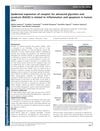October 2023 in “Nutrients” Millet and wheat extracts may improve hair health and promote growth.
 December 2022 in “Journal of Education, Health and Sport”
December 2022 in “Journal of Education, Health and Sport” Covid-19 can cause different types of hair loss, which can affect people's mental and social well-being.
 54 citations,
June 2003 in “The journal of investigative dermatology. Symposium proceedings/The Journal of investigative dermatology symposium proceedings”
54 citations,
June 2003 in “The journal of investigative dermatology. Symposium proceedings/The Journal of investigative dermatology symposium proceedings” Disruptions in hair follicle fibroblast dynamics can cause hair growth problems.
24 citations,
August 2022 in “Immunity” Type 2 immunity helps control mite growth in hair follicles, preventing damage.
 18 citations,
April 2013 in “PLOS ONE”
18 citations,
April 2013 in “PLOS ONE” Mice with autoimmune hair loss showed signs of heart problems.
2 citations,
January 2013 in “Journal of cosmetics, dermatological sciences and applications” Using a special shampoo and scalp tonic together can greatly reduce severe dandruff and its causes.
 December 2022 in “Journal of Education, Health and Sport”
December 2022 in “Journal of Education, Health and Sport” COVID-19 can cause hair loss, often treated effectively with a combination of supplements and topical treatments.
 1 citations,
September 2023 in “Applied sciences (Basel)”
1 citations,
September 2023 in “Applied sciences (Basel)” Ishige sinicola extract may help prevent muscle atrophy through its antioxidant and anti-inflammatory effects.
Gushen Shengfa pills and Wuling capsules are more effective for hair growth and sleep quality than the control treatment.
 12 citations,
August 2021 in “International Journal of Biological Macromolecules”
12 citations,
August 2021 in “International Journal of Biological Macromolecules” Poria cocos polysaccharides and finasteride both help treat chronic nonbacterial prostatitis, but Poria cocos polysaccharides also improve gut health.

COVID-19 may be linked to hair loss called Telogen Effluvium, affecting quality of life and self-esteem.
 9 citations,
June 2020 in “BMC Molecular and Cell Biology”
9 citations,
June 2020 in “BMC Molecular and Cell Biology” Stress hormone CRF can cause hair loss by affecting hair growth cells and hormones.
 March 2024 in “Advanced science”
March 2024 in “Advanced science” A new hydrogel made from human cells improves wound healing by working with immune cells to promote repair.
56 citations,
September 2016 in “Pharmaceutical Research” The fish oil-based gel with imiquimod improves skin cancer treatment and reduces inflammation.
 4 citations,
January 2022 in “Journal of clinical and translational research”
4 citations,
January 2022 in “Journal of clinical and translational research” Chitosan-based dressings reduce inflammation and speed up skin wound healing.
October 2022 in “Biomolecules” Allopregnanolone can reduce gut inflammation and normalize neurotransmitter levels after finasteride withdrawal.
1 citations,
January 2021 in “European Journal of Inflammation” Methylated flavonoids may effectively reduce depression and inflammation caused by finasteride.
 December 2023 in “Communications biology”
December 2023 in “Communications biology” Targeting the HEDGEHOG-GLI1 pathway could help treat keloids.
 12 citations,
July 2022 in “Journal of Cosmetic Dermatology”
12 citations,
July 2022 in “Journal of Cosmetic Dermatology” COVID-19 patients may experience temporary hair loss, mainly in women, which is likely reversible.
 October 2023 in “Dermatology practical & conceptual”
October 2023 in “Dermatology practical & conceptual” Many patients experienced hair loss after COVID-19, with women affected more, starting on average 49 days post-infection.
 September 2021 in “CRC Press eBooks”
September 2021 in “CRC Press eBooks” Lupus can cause a type of hair loss that doesn't scar, due to inflammation.
 78 citations,
October 2020 in “Experimental Dermatology”
78 citations,
October 2020 in “Experimental Dermatology” Hidradenitis suppurativa is caused by genetic factors, inflammation, bacteria, hormones, and lifestyle factors like obesity and smoking.
 10 citations,
November 2015 in “Experimental Dermatology”
10 citations,
November 2015 in “Experimental Dermatology” Skin RAGE levels are linked to inflammation and cell death.
 4 citations,
June 2022 in “Indian Dermatology Online Journal”
4 citations,
June 2022 in “Indian Dermatology Online Journal” COVID-19 may cause temporary hair loss due to direct damage to hair follicles, but it usually gets better on its own.
 20 citations,
February 2017 in “International Journal of Dermatology”
20 citations,
February 2017 in “International Journal of Dermatology” Honokiol helps protect skin from damage and aging caused by cigarette smoke.
15 citations,
February 2021 in “Frontiers in immunology” Leptin, a hormone from fat cells, affects immune responses and can influence skin diseases and hair growth.
July 2014 in “International Journal of Dermatology and Venereology” 127 citations,
January 2000 in “Journal of Investigative Dermatology” Cytotoxic T cells cause hair loss in chronic alopecia areata.
 4 citations,
November 2021 in “Pharmaceuticals”
4 citations,
November 2021 in “Pharmaceuticals” Paeonia lactiflora and Poria cocos extracts can potentially increase hair growth and reduce hair loss symptoms by lowering testosterone and inflammation levels.
 April 2017 in “Journal of Investigative Dermatology”
April 2017 in “Journal of Investigative Dermatology” Certain microRNAs may protect against hair loss in alopecia areata and could be potential treatment targets.



















